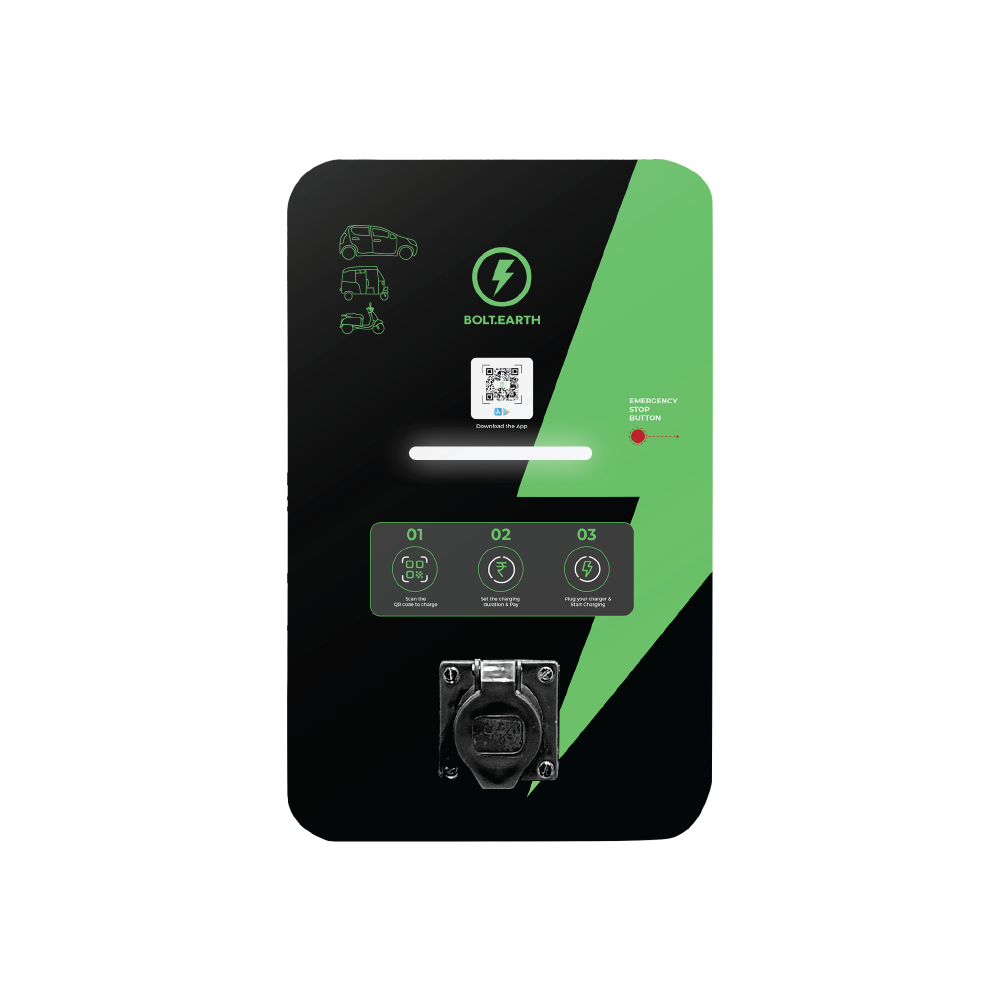Get The Latest News and Events in The EV Industry
Discover the latest news and events happening within the EV Industry. Gain business insights into the world of EV charging and the infrastructure that supports it.
Our Blog Posts

The Current State of EV Charging in India [2026]: Public, Home, and Fleet Networks
Feb 09, 2026EV Charging Infrastructure
Read More

Delhi’s EV Policy 2026: Incentives, Infrastructure and Impact
Feb 05, 2026State-wise EV Policies
Read More

Solar-Powered EV Charging in India’s Tier-2/3 Cities: Opportunities and Challenges
Jan 30, 2026EV Charging Infrastructure
Read More

EV Charging Compliance Checklist for CPOs in India: Complete Guide
Jan 29, 2026EV Ecosystem
Read More

OCPP 2.0.1 Explained: Why It Matters for Indian CPOs
Jan 23, 2026EV Charging Infrastructure
Read More

What Is Bidirectional Charging? Is It the Next Big Thing for EV Owners in India?
Jan 22, 2026EV Ecosystem
Read More

How Unified Bharat e-Charge (UBC) Benefits Every Stakeholder in the EV Ecosystem
Jan 21, 2026EV Ecosystem
Read More

Unified Bharat e-Charge (UBC) Explained: India’s EV Charging Interoperability Framework
Jan 16, 2026EV Charging Infrastructure
Read More

EV Charging Etiquette for Drivers
Jan 13, 2026EV Ecosystem
Read More

Public vs Captive EV Charging: Definitions and Examples
Jan 08, 2026EV Ecosystem
Read More

Maharashtra’s New Electric Vehicle Policy (2025–2030)
Jan 07, 2026State-wise EV Policies
Read More

EV Policies That Made Headlines in 2025
Dec 19, 2025EV Events and Industry Reports
Read More

How to Save Money on EV Charging: Complete Guide
Dec 18, 2025EV Charging Infrastructure
Read More

How to Prep Your EV for Long Road Trips
Dec 12, 2025EV Ecosystem
Read More

Top EV Launches in India 2025: Cars, Scooters and 3-Wheelers [+Bolt.Earth Charger Compatibility]
Dec 08, 2025EV Technology and Trends
Read More

6 EV Myths Everyone Should Stop Believing
Dec 04, 2025EV Ecosystem
Read More

India’s EV Charging Infrastructure Policy 2025: Impact on CPOs and OEMs
Nov 28, 2025EV Charging Infrastructure
Read More

How 5G Will Transform EV Charging in India by 2026
Nov 27, 2025EV Technology and Trends
Read More

Sodium-Ion vs. Lithium-Ion Batteries: Which Is Better for Electric Vehicles?
Nov 25, 2025EV Ecosystem
Read More

How Real Estate Developers Can Monetize EV Charging in India (2026 Guide)
Nov 24, 2025EV Charging For Commercial Buildings and Workspaces
Read More

Why Range Anxiety Is a Myth, And What Should We Be Talking About
Nov 19, 2025EV Technology and Trends
Read More

EV Roaming in India: What It Means for Interoperability and User Experience
Nov 17, 2025EV Ecosystem
Read More

9 Best Practices to Secure EV Charging Infrastructure in India
Nov 14, 2025EV Charging Infrastructure
Read More

EV Charging Cybersecurity in India: Threats, Risks, and Policy Landscape
Nov 13, 2025EV Technology and Trends
Read More

EV Charging Connectors in India: A Masterclass on Standards
Nov 06, 2025EV Charging Infrastructure
Read More

Implementing DC Fast Charging: A Fleet Manager’s Guide
Nov 05, 2025EV Fleet and Commercial Adoption
Read More

Top 5 EV Charging Innovations of 2026 Set to Solve Range Anxiety
Oct 28, 2025EV Technology and Trends
Read More

DC Fast Charging for Fleets: How to Maximize Uptime and ROI
Oct 24, 2025EV Fleet and Commercial Adoption
Read More

How Tamil Nadu’s EV Policy Is Accelerating DC Fast Charging in India
Oct 17, 2025State-wise EV Policies
Read More

Why DC Fast Chargers Are Critical for India’s Highway EV Push
Oct 15, 2025EV Charging Infrastructure
Read More

Choosing the Right DC Fast Charger for Hotels, Malls, and Office Spaces
Oct 09, 2025EV Charging For Commercial Buildings and Workspaces
Read More

DC Fast Chargers and Their Growing Role Across Highways Corridors and City Centers
Oct 07, 2025EV Charging Infrastructure
Read More

DC Charging vs AC Charging for EVs: What Businesses Need to Know
Oct 06, 2025EV Charging Infrastructure
Read More

Charging Ahead: India’s EV Charging Network Quadruples in 15 Months
Sep 30, 2025EV Charging Infrastructure
Read More

Is Range Anxiety Over? India’s EV Network Now Covers 65% of Pin Codes
Sep 30, 2025EV Charging Infrastructure
Read More

How India’s EV Infrastructure Rise Will Reshape Mobility, Mindsets, and Market Dynamics by 2040
Sep 26, 2025Global EV Market Trends
Read More

What is Smart Parking? The Rise of EV Charging & IoT in Real Estate
Sep 23, 2025EV Charging For Commercial Buildings and Workspaces
Read More

Green Building Certifications and EV Integration: A Win-Win for Developers & Residents
Sep 19, 2025EV Charging for Societies and Apartment Complexes
Read More

Guide to EV Charging in Apartment Complexes: All You Need to Know
Sep 18, 2025EV Charging for Societies and Apartment Complexes
Read More

The Rise of EV-Ready Homes in India: Why Future-Proofing Your Property Matters
Sep 17, 2025EV Charging for Societies and Apartment Complexes
Read More

EV Charging Accessibility: Are We Designing for Everyone?
Sep 09, 2025EV Ecosystem
Read More

Dynamic Load Balancing: How Smart EV Chargers Prevent Grid Overload
Sep 08, 2025EV Charging Infrastructure
Read More

EV Charging Trends 2025: What OEMs, Airports, and Governments Are Prioritizing
Sep 02, 2025EV Charging Infrastructure
Read More

5-Point Guide to Earning Revenue With EV Charging
Aug 26, 2025EV Charging For Commercial Buildings and Workspaces
Read More

Universal EV Chargers Explained:Solving the Fragmented Charging Ecosystem
Aug 22, 2025EV Ecosystem
Read More

EV Charger Certifications in India: Ultimate Guide to 3 Major Types, Uses, and How to Get Them
Aug 19, 2025EV Charging Infrastructure
Read More

How Fleet Electrification Can Help India Achieve Its 2030 EV Goals
Aug 14, 2025EV Fleet and Commercial Adoption
Read More

Government Incentives for EV Charging Infrastructure in India
Aug 12, 2025EV Charging Infrastructure
Read More

Part 2: Scaling Workplace EV Charging in India: Global Case Studies, Business Models, and Investment Opportunities
Aug 07, 2025EV Charging For Commercial Buildings and Workspaces
Read More

Part 1: The Future of Workplace EV Charging in India
Aug 05, 2025EV Charging For Commercial Buildings and Workspaces
Read More

Fast Charging vs. Battery Swapping: Evaluating ROI for Indian EV Fleets
Jul 31, 2025EV Fleet and Commercial Adoption
Read More

Why Blaze DC Is the Right Choice for Apartments and Enterprises
Jul 29, 2025EV Charging for Societies and Apartment Complexes
Read More

Why Blaze DC Is the Right Choice for EV Charging Hosts
Jul 25, 2025EV Charging For Commercial Buildings and Workspaces
Read More

Why Blaze DC Is the Right Choice for EV Dealerships
Jul 22, 2025EV Auto Dealership Solutions
Read More

Top 10 EV Charger Manufacturers in India [2025]
Jul 17, 2025EV Events and Industry Reports
Read More

Why Blaze DC Is the Right Choice for Delivery Hubs
Jul 14, 2025EV Charging For Commercial Buildings and Workspaces
Read More

Why Blaze DC Is the Right Choice for Urban Fleet Operators
Jul 10, 2025EV Fleet and Commercial Adoption
Read More

Introducing Blaze DC: India’s First-Ever Universally Compatible Fast Charger for 2- and 3-Wheelers
Jul 07, 2025EV Charging Infrastructure
Read More

Is Charging Your Electric Vehicle From a Household Socket a Good Idea?
Jul 02, 2025EV Charging for Societies and Apartment Complexes
Read More

Exploring the UK's Dynamic EV Market Landscape
Dec 25, 2023EV Charging Infrastructure
Read More

Revolutionizing Commercial Mobility With OS in Electric Trucks & Vehicles
Dec 19, 2023EV Charging Infrastructure
Read More

Exploring South Korea’s EV Success
Dec 11, 2023EV Charging Infrastructure
Read More

How to Leverage The Potential of All-Solid-State Batteries for Electric Vehicles
Dec 07, 2023EV Technology and Trends
Read More

How Data Insights Maximize EV Performance
Nov 28, 2023EV Technology and Trends
Read More

The Rise of Electric Vehicles in South Africa
Nov 22, 2023Global EV Market Trends
Read More

EV Technology in 2023: Current Trends and Future Prospects
Nov 16, 2023EV Charging Infrastructure
Read More

How Operating Systems Influence Two-Wheeler EVs' Advanced Driver Assistance Systems
Nov 15, 2023EV Charging Infrastructure
Read More

The Role of OEMs in Driving Platform Integration within OS
Nov 02, 2023EV Charging Infrastructure
Read More

Bolt.Earth Brings Global EV Strategies to EICMA 2023
Nov 02, 2023EV Events and Industry Reports
Read More

The Power of Dynamic Electric Vehicle Operating System Integration
Oct 27, 2023EV Charging Infrastructure
Read More

The Rise of Electric Vehicles in Japan: An Exploration of Market Trends
Oct 23, 2023Global EV Market Trends
Read More

How Fast EV Charging Will Transform India’s Energy Landscape
Oct 13, 2023EV Charging Infrastructure
Read More

How Cloud-Based Updates Are Transforming The Automotive Software Space
Oct 03, 2023EV Charger Management Systems
Read More

Why Cybersecurity Matters to the EV Ecosystem
Sep 18, 2023EV Ecosystem
Read More

How India’s EV Ecosystem Supports Local Communities
Sep 14, 2023EV Ecosystem
Read More

How Public-Private Sector Collaboration Can Accelerate EV Adoption in India
Sep 06, 2023EV Ecosystem
Read More

China’s EV Market: Opportunities, Challenges, and Future Scope
Aug 31, 2023Global EV Market Trends
Read More

How EVs Can Help India Build Smarter, More Sustainable Cities
Aug 21, 2023EV Ecosystem
Read More

Vietnam's EV Landscape & Market: An In-Depth Analysis
Aug 10, 2023Global EV Market Trends
Read More

How Electric Vehicles Can Help Decentralize the Energy Grid in India
Aug 03, 2023EV Ecosystem
Read More

Navigating the Dynamic EV Landscape and Market in Singapore
Jul 31, 2023Global EV Market Trends
Read More
![India’s EV Revolution: Scaling 3-Wheeled Commercial Transport [2025 Update]](/_next/image?url=https%3A%2F%2Fbolt-wordpress.bolt.earth%2Fwp-content%2Fuploads%2F3_wheeled_Commercial_Transport_Feature_Image_163771ee6b.jpg&w=2048&q=75&dpl=48f0c704-b4cf-4af0-870d-0b4f6a3b6e67)
India’s EV Revolution: Scaling 3-Wheeled Commercial Transport [2025 Update]
Jul 24, 2023EV Charging Infrastructure
Read More

Exploring the Indonesian EV Market
Jul 21, 2023Global EV Market Trends
Read More

The Role of EVs in Corporate Fleets in India (2025 Update)
Jul 13, 2023EV Fleet and Commercial Adoption
Read More

An In-Depth Analysis of the Thailand EV Industry
Jul 10, 2023EV Charging Infrastructure
Read More

Innovative Financing Models for India's EV Charging Infrastructure
Jul 07, 2023EV Charging Infrastructure
Read More

The Impact Of EV Charging Infrastructure On Mobility in India
Jul 03, 2023EV Charging Infrastructure
Read More

An Introduction to Software-Defined Vehicles
Jun 23, 2023EV Charging Infrastructure
Read More

EV Infrastructure in India: What to Expect By 2030
Jun 20, 2023EV Charging Infrastructure
Read More

Solar EV Charging in India: Why RWAs Must Lead the Transition
Jun 14, 2023EV Charging for Societies and Apartment Complexes
Read More

Assessing the Environmental Impact of EVs in India by 2030
Jun 06, 2023EV Ecosystem
Read More

How The EV Ecosystem Can Drive EV Adoption in India
May 24, 2023EV Ecosystem
Read More

How RWAs Can Navigate Government Guidelines for Efficient In-Home EV Charging Installation
May 08, 2023EV Charging for Societies and Apartment Complexes
Read More

EV Charging in Apartments and RWAs: Simplifying Installation in India
Apr 20, 2023EV Charging for Societies and Apartment Complexes
Read More

The Importance of Affordable Slow Chargers in Building a Robust Country-Wide EV Network
Apr 13, 2023EV Charging Infrastructure
Read More

Best Practices for Achieving a Sustainable Residential EV Charging Ecosystem
Mar 28, 2023EV Charging for Societies and Apartment Complexes
Read More

Exploring the Role of Software in Advancing EV Adoption
Mar 14, 2023EV Charger Management Systems
Read More

The Future of Electric Vehicles in India: Opportunities and Challenges
Feb 10, 2023EV Ecosystem
Read More

Part 3: EV Charging Infrastructure in India – Strategic Recommendations
Jun 24, 2022EV Charging Infrastructure
Read More

Part 2: Developing Electric Vehicle Charging Infrastructure in India–Business Opportunities and Risks
Jun 14, 2022EV Charging Infrastructure
Read More

Part 1: Assessment of India's Current Electric Vehicle (EV) Charging Infrastructure
Jun 07, 2022EV Charging Infrastructure
Read More


